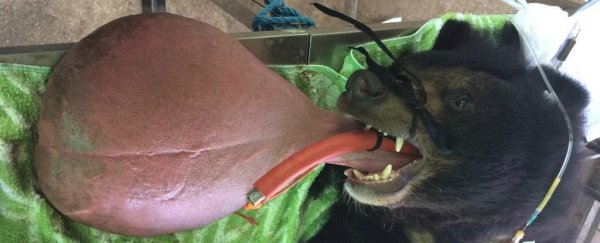A rescued moon bear in Myanmar had to have surgery after its tongue got so big it was dragging along the floor.
By the time vets managed to finally remove the growth, it had swollen to over 3 kilograms (6.6 pounds) of tissue - long past the point of fitting in the bear's head.
Not long after he was rescued as a cub, the bear, named Nyan htoo ("bright"), started showing signs of a curious ailment: his tongue was swelling to a prodigious size.
Vets operated in 2016 to try and solve the problem, but after a good initial recovery, the tongue grew back bigger than ever.
By June 2017, the tongue was becoming injured on Nyan htoo's teeth, and the poor bear frequently needed to rest his head because of the additional weight.
Moon bears, or Asiatic black bears (Ursus thibetanus), are nicknamed for the bright, crescent-shaped patches on their chests.
They are frequently the subject of rescue missions - the bears are poached, sold, and killed or kept in captivity to harvest their body parts. An especially common target is their bile, which is still used in traditional Asian medicine despite the availability of synthetic and herbal alternatives.
Because of this, and because of habitat loss due to logging deforestation, agricultural expansion and roads, the species is listed as vulnerable on the IUCN Red List of Endangered Species.
Nyan htoo and his brother were rescued by monks in Myanmar, who intercepted the pair before they could be sold illegally in China.
Now vets from around the world have saved Nyan htoo a second time. Heather Bacon from the University of Edinburgh's veterinary school, veterinary nurse Caroline Nelson from the Animals Asia Bear Rescue Centre in Vietnam and Romain Pizzi from Wildlife Surgery International flew to Myanmar and worked together with local vets to amputate the tongue.
Because this is the first time this has been seen in a bear, the team aren't entirely sure what caused it. They do suspect the condition was caused by a disease called lymphatic filariasis, a type of elephantiasis caused by parasitic worms spread by mosquitoes.
It's actually quite common in humans in Myanmar, but if it's really what caused Nyan htoo's tongue to swell, it will be the first time this condition has been observed in a bear.
Thankfully, the story has a happy ending, since the surgery was successful and Nyan htoo is now recovering and adapting to his new life without the painful disfigurement in his mouth.
"Thanks to the enthusiasm and compassion of all involved in this uniquely collaborative project, we have been able to make a tangible improvement in the quality of Nyan htoo's life," Bacon said.
"[We] hope to continue our work in Myanmar to promote improvements in animal welfare and veterinary training."
